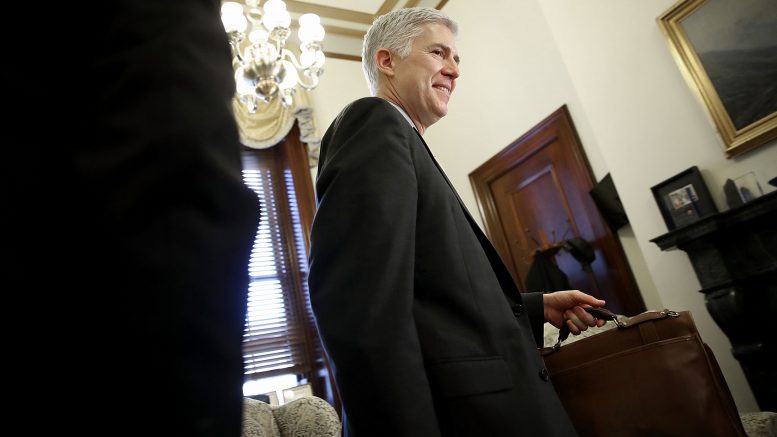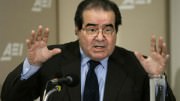U.S. Supreme Court justices indicated they are divided in a case over a shooting across the Mexican border, hinting they may split 4-4 and leave high court nominee Neil Gorsuch to cast the deciding vote.
Hearing arguments in Washington, the justices weighed an appeal from the parents of Sergio Hernandez, a Mexican teenager who was shot to death by a U.S. Border Patrol agent in 2010. The family is seeking to sue the agent in federal court, arguing that U.S. constitutional protections apply to Hernandez even though he wasn’t in this country when he was shot.
Justice Anthony Kennedy joined the court’s conservative wing in questioning whether the federal judiciary should be involved in the case given its implications for foreign affairs. The court’s four liberal justices suggested they thought the suit should go forward.
The case has “United States written all over it,” Justice Ruth Bader Ginsburg said.
Should the eight justices split 4-4, they could hold the case and schedule a second argument after a ninth justice is seated. A Senate panel is scheduled to hold hearings next month on President Donald Trump’s nomination of Gorsuch to fill the high court’s vacancy.
International Border
Hernandez, 15, was shot while in a culvert whose center is the international border between El Paso, Texas, and Juarez, Mexico. His parents say Sergio and his friends were playing a game that involved running up the incline on the U.S. side, touching the fence there and then running back into Mexican territory. The border patrol agent, Jesus Mesa, was patrolling the U.S. side of the culvert on bicycle when he fired the fatal shot.
The FBI at one point said the youths were throwing rocks, although Hernandez’s parents say video evidence refutes that account. The parents say they should be able to sue Mesa under the Constitution’s Fourth and Fifth Amendments.
U.S. officials declined to prosecute Mesa, and the Obama administration rejected a request to extradite him to Mexico.
The Supreme Court has said the Constitution generally doesn’t extend overseas to non-citizens. In 1990, the court ruled that the Fourth Amendment didn’t apply to the search of a Mexican citizen’s property in Mexico by U.S. drug agents.
Flood of Claims
Chief Justice John Roberts said a ruling favoring the Hernandez family might open the door to a flood of other claims, such as suits over overseas attacks by drones that are controlled from U.S. territory. Roberts told the family’s lawyer, Robert Hilliard, that his arguments couldn’t be “narrowly confined.”
Justice Stephen Breyer suggested the court could treat the culvert as a special case — and apply the Fourth Amendment there — given that it is jointly maintained under a treaty between the two nations.
Breyer pointed to a 2008 Supreme Court decision that said inmates being held at Guantanamo Bay, the U.S. naval base in Cuba, have constitutional rights and may seek release in federal court. That case established that the boundary is “not the only factor” in determining whether the Constitution applies, Breyer said.
Mesa’s lawyer, Randolph Ortega, argued that the Hernandez family lacks the legal right to sue, no matter how far the Constitution reaches. While a 1971 Supreme Court ruling lets victims of police misconduct in the U.S. sue on a claim their Fourth Amendment rights were violated, Ortega said that ruling shouldn’t be extended to cover foreigners abroad.
The case is one of several on the court’s docket touching on issues that could arise should Trump’s immigration and deportation policies reach the Supreme Court. The court in November considered whether foreigners have a right to periodic bond hearings while they are in custody during deportation proceedings.Another case argued in January asks whether foreigners who were detained for months after the Sept. 11 attacks can sue former Attorney General John Ashcroft and other officials. The court will decide the cases by June.
The border-shooting case is Hernandez v. Mesa, 15-118.
Please visit the source link below to read the entire article.
Source: www.bloomberg.com



Be the first to comment on "Border-Shooting Lawsuit May Divide U.S. Supreme Court Justices"